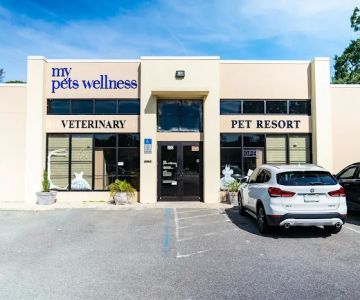Addressing Gastrointestinal Issues in Pets: Solutions and Tips
As pet owners, we often face the challenge of managing gastrointestinal issues in our furry companions. Whether it's diarrhea, constipation, vomiting, or bloating, these issues can cause significant discomfort for pets and distress for their owners. Over the years, I have had my fair share of experiences with pets facing gastrointestinal (GI) problems, and today, I want to share some solutions, tips, and personal insights that can help you manage these issues effectively.

6370 North Point Pkwy, Alpharetta, GA 30022, USA
See Details1. Understanding the Root Causes of GI Issues in Pets
Gastrointestinal issues in pets can be caused by a variety of factors. From diet changes to infections, parasites, allergies, and even stress, it’s important to understand the root cause to address the issue properly. In my experience, the first step is to identify whether the problem is short-term or chronic. Acute GI issues might be due to a recent change in food or stress, while chronic conditions can point to a deeper issue like food intolerance or an underlying health condition.
For example, my dog, Max, once developed a stomach upset after we introduced a new brand of dog food. The change in ingredients triggered a mild case of diarrhea, which lasted for a few days. However, after switching back to his usual food, his condition improved. This experience taught me the importance of making gradual changes to a pet's diet to avoid sudden GI disturbances.
2. Common Symptoms of GI Issues
The symptoms of gastrointestinal issues in pets can vary greatly depending on the severity and type of problem. Here are a few common signs to watch for:
- Diarrhea: One of the most common symptoms of digestive upset. It can be caused by infections, food intolerance, or even stress.
- Vomiting: Vomiting can be due to something as simple as eating too quickly, or as serious as a stomach infection or poisoning.
- Loss of Appetite: If your pet refuses to eat, it could be a sign of discomfort in the stomach or other parts of the digestive tract.
- Bloating: In severe cases, bloating can indicate a more serious problem, like bloat or a twisted stomach, which requires immediate veterinary care.
If your pet exhibits any of these symptoms persistently, it's crucial to consult your veterinarian to determine the cause and get appropriate treatment.
3. Tips for Managing GI Issues at Home
When gastrointestinal issues strike, it's natural to feel helpless. But there are steps you can take at home to alleviate your pet's discomfort and even prevent future flare-ups. Here are some practical tips that I’ve found helpful:
- Maintain a Consistent Diet: A sudden change in diet can upset your pet's stomach. Gradually transition your pet to new food over a period of 7-10 days to prevent digestive upset.
- Hydration is Key: Pets with diarrhea or vomiting can become dehydrated quickly. Make sure your pet always has access to fresh, clean water. Adding an electrolyte solution to their water can also help.
- Probiotics for Pets: Just like humans, pets can benefit from probiotics to promote a healthy balance of gut bacteria. I’ve used probiotics for my pets during GI issues, and they’ve helped improve digestion and reduce symptoms.
- Smaller, Frequent Meals: If your pet is experiencing nausea or vomiting, try offering smaller, more frequent meals instead of one or two large meals per day.
- Avoid Human Food: It can be tempting to give your pet a treat from your plate, but many human foods can irritate a pet’s digestive system. Stick to pet-friendly snacks and treats.
4. When to Seek Veterinary Help
While many gastrointestinal issues can be managed at home, there are times when professional help is necessary. If your pet’s symptoms last for more than 24-48 hours, or if they exhibit severe symptoms like vomiting blood, excessive lethargy, or bloating, it's time to seek veterinary assistance. I learned this lesson the hard way when my cat, Bella, started vomiting excessively and became lethargic. After a trip to the vet, we discovered she had a severe intestinal infection that required medication and close monitoring.
In more severe cases, your veterinarian may recommend diagnostic tests such as blood work, X-rays, or an ultrasound to identify the underlying cause of the issue. Early intervention can prevent more serious complications and help your pet recover more quickly.
5. Preventing Gastrointestinal Issues in Pets
While we can’t prevent every gastrointestinal problem, there are proactive steps you can take to reduce the likelihood of your pet experiencing digestive issues:
- Choose High-Quality Pet Food: Quality matters when it comes to your pet's diet. Look for food with high-quality ingredients and avoid fillers like corn, soy, and wheat.
- Regular Vet Checkups: Regular visits to the vet can help catch any early signs of digestive or other health issues before they become serious.
- Exercise and Mental Stimulation: Regular exercise and mental stimulation can reduce stress and anxiety in pets, which are common triggers for digestive upset.
- Monitor Your Pet's Behavior: Pay attention to your pet’s eating habits, stool consistency, and overall behavior. Early detection of abnormalities can help prevent bigger issues down the line.
Addressing gastrointestinal issues in pets requires patience, attention, and sometimes a bit of trial and error. However, with the right knowledge and approach, most pets can recover quickly and get back to feeling their best. Whether it’s a simple upset stomach or a more serious condition, understanding the causes, symptoms, and treatments of GI problems can help you provide the best care for your furry friend.
6. Real-Life Story: How We Helped Max
To close, I want to share a story about my dog, Max, and how we successfully handled his gastrointestinal issue. Max, a rambunctious lab mix, once developed diarrhea after a fun day at the park. He had gotten into something he shouldn’t have, and we knew we had to act quickly. I followed the tips mentioned above: I withheld food for 12 hours to let his stomach settle, ensured he stayed hydrated, and gradually reintroduced bland food. By the next day, he was back to his normal self—running around and wagging his tail.
This experience reinforced the importance of knowing when to intervene and when to seek professional help. I was fortunate that Max's issue was mild, but every pet is different, and it’s essential to remain vigilant and responsive when dealing with gastrointestinal issues.










